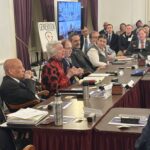Over 100 tourism and hospitality industry leaders gathered at the State House on April 10 to engage with legislators and raise awareness of the collective contributions of these industries to the Vermont economy. Tourism Economy Day, convened by the Vermont Chamber of Commerce, Ski Vermont and Vermont Specialty Food Association, brought businesses together to advocate for a thriving Vermont visitor economy.
The Vermont visitor economy has a $4 billion annual economic impact and represents 10% of our workforce. In 2023 alone, 15.8 million visitors spent $4.0 billion across lodging, dining, retail, entertainment, recreation, and more. Their spending also contributed $282.3 million in state and local taxes—equivalent to approximately $1,039 per Vermont household. Businesses, legislative leaders, and Administration officials collaborated for a day of advocacy that elevated the collective contributions of the visitor economy to Vermont. Advocacy day highlights included a joint hearing with the Senate Committee on Economic Development, Housing and General Affairs and House Committee on Commerce and Economic Development, a joint resolution recognizing April 10, 2025, as Tourism Economy Day, and an evening food and beverage tasting reception with the Vermont Specialty Food Association.
Rep. Abbey Duke (Chittenden-17), a stalwart supporter of the tourism industry, shared “Vermont’s tourism sector is a cornerstone of our state economy, generating billions in economic activity, supporting tens of thousands of jobs, and enriching our communities. It’s essential for legislators to support policies that foster sustainable growth in tourism, including investments in infrastructure, housing, workforce development, and supporting local businesses.”
“A thriving tourism economy means vibrant communities and a chance for everyone—whether you’re a local or a visitor—to experience the very best of Vermont. However, the industry is facing challenges echoed by so many across the state: an aging declining workforce and a critical housing shortage.” said Amy Spear, President of the Vermont Chamber of Commerce. “It’s crucial that we find a path towards affordability and abundance, improving economic conditions. Vermont’s beauty and charm are undeniable, and together, we can create an environment where both our tourism industry and our communities can thrive for generations to come.”
Business leaders highlighted the following sentiments in their testimonies: the role of tourism supporting Vermont’s economy and communities, the industry’s centrality in providing jobs and making Vermont an appealing destination to both live and visit, and the collective challenges facing businesses in the industry, including: workforce shortages, workforce housing accessibility and affordability, rising taxes and high operating costs and a strained relationship with Canadian neighbors due to federal rhetoric.
“Outdoor recreation is a significant part of Vermont’s tourism economy, driving visits and fueling the economy in many rural parts of our state. In 2023, outdoor recreation accounted for 4.8% of the state’s GDP, or $2.1B annually, and 5.1% of the state’s workforce, according to the US Bureau of Economic Analysis,” said Molly Mahar, President of Vermont Ski Areas Association. “Vermont ranks second only to Hawaii in percent of GDP generated by outdoor recreation, which is largely driven by activities like skiing, snowboarding, hiking, mountain biking, and camping. However, businesses are grappling with workforce and housing shortages, higher costs, and new uncertainty around Canadian visitation levels, which limit growth.”
Additional business and policy leaders that testified were Nina Ridhibhinyo, Director of Programs & Strategy at ECHO, Leahy Center for Lake Champlain, Randy George, Owner of Red Hen Baking Co., Québec Delegate Rene Sylvestre of the Québec Government Office in Boston, Will Kriewald, CEO of Basin Harbor Resort and Boat Club, Abby Long, Executive Director of Kingdom Trails, Kate Trzaskos, Executive Director of Downtown Brattleboro, Vicky Allard, Founder and Executive Chef at Blake Hill Preserves, Steve Wright, President/General Manager at Jay Peak Resort, and Kim Jackson, Director of Communications and Marketing at Vermont Adaptive.
The day ended with a Vermont Specialty Food Association Legislative Tasting, featuring vendors from across Vermont. Karin Cioffi, Executive Director of VSFA shared, “Vermont’s specialty food and beverage producers are a cornerstone of the state’s identity and a driving force behind the visitor experience. Tourists don’t just come for the views, they come to taste Vermont. From handcrafted cheeses to small batch spirits, these products represent the passion, innovation, and resilience of our local businesses. Our evening tasting event at the State House showcased the incredible talent of producers across the state and underscored just how vital this industry is to Vermont’s economy, culture, and continued appeal as a destination.”




Photo Credit for Images 3 and 4: Blake Hill Preserves

















